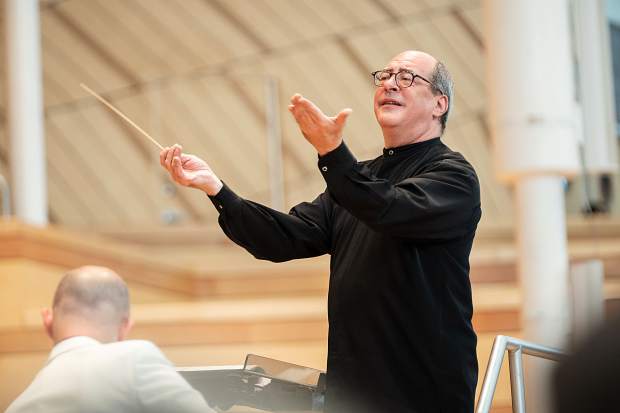Inside the making of the virtual Aspen Music Festival season – Aspen Times


Maestro Robert Spano conducts during the final 2018 concert of the Aspen Music Festival. The finale at Benedict Music Tent draws a big crowd each year.
Photo courtesy Grittani Creative
The Aspen Music Festival and School’s summer concert season is normally a logistical feat to behold, though most listeners never see or think much about the massive behind-the-scenes operation that moves pianos and orchestra equipment from venue to venue for some 400 concerts nonstop for eight weeks.
For the summer of coronavirus, as the festival moved all of its programming online, the technical achievement is no less complicated. It may be more of a feat, it turns out, to bring together artists on stages around the world for live concerts under the virtual Aspen tent.
The virtual Aspen season starts this weekend with a Fourth of July concert of patriotic favorites, recorded at the annual holiday concert in recent years at the Benedict Music Tent. On Sunday, the festival launches its first live event, for which it is bringing out some of the Music Fest’s favorite stars to honor music director Robert Spano, who is celebrating his 10th year in the post.
The live performances on the show will include some artists performing in Aspen.
The pianist Yefim Bronfman, who is living here for the summer, will perform from Harris Concert Hall (as he did this week for the virtual Aspen Ideas Festival). Mezzo-soprano Kelley O’Connor will also perform from the Harris stage, as will Michelle DeYoung (who lives in Boulder).

Support Local Journalism
Violinist Robert McDuffie and Spano himself will be on a stage in Macon, Georgia, and most of the guest artists are strewn about the U.S. and abroad. Renee Fleming will be performing from her home studio in Virginia, Roderick Cox will be live from Berlin. Concerts in coming weeks will come live from Seattle (James Ehnes, July 12), from La Jolla (Alisa Weilerstien and Inon Barnatan, July 26), with others coming from Steinway Hall in New York, Switzerland and elsewhere.
A remote production team and fleet of sound engineers have been setting up the concerts — sending artists equipment, tweaking it for their varied settings and preparing what the Music Fest hopes will be a virtual experience worthy of the talents on the bill and seven-plus decade tradition of Aspen concerts.
“The team is working in advance and will be working live to make sure that this is worthy of who we are,” Music Festival President and CEO Alan Fletcher said.
The producer-director of the series, Habib Azar, was a student of Fletcher’s at Carnegie Mellon University. In an Emmy-winning career overseeing multi-camera broadcast of live events, Azar has produced the Metropolitan Opera’s “Live in HD” series and “Live from Lincoln Center” and has — through the COVID-19 crisis — helped many presenters go virtual, producing concerts for Juilliard and the New York Philharmonic along with the Music Fest.
Producing this Sunday’s concert, and the weekly recitals running through Aug. 23, Fletcher and festival leaders sought to make something meaningful — not simply a placeholder during the public health crisis.
It’s not as simple as flipping on Zoom and letting it rip.
The festival sought to create the highest quality audio and video experience possible, Fletcher explained. They put together kits with their favored web cameras, microphones, lighting kits and such, sent them out to the participants and have been running test concerts and sound checks with all of them.
The details are not something Fletcher and his colleagues ever anticipated being mired in. On a conference call with presenting executives around the world discussing the intricacies of virtual concerts, Fletcher recalled, one arts leader chimed in, “If I wanted to do this kind of thing I would have gone into TV and I would have made a lot more money.”
And yet, the challenge to serve loyal audiences and find new ones through this crisis is fulfilling, Fletcher said: “Also it is exciting and fun.”
Enough so, Fletcher said, that he believes the Music Fest will continue making live virtual content in the years to come — even after gathering for concerts is safe again. The educational programs they’re crafting, which begin next week and are also free, have been particularly exciting to think about as part of an ongoing curriculum in ears to come.
“We are learning about producing really meaningful content that can reach people all over the world,” Fletcher said. “We will continue with that.”
The Music Fest team also put a guidance page on its website, directing viewers on how to get the best quality audio-visual experience from the webcasts (best experienced through a TV and with a stereo system rather than laptop or phone speakers).
The concerts will be hosted on YouTube, broadcast on the aspenmusicfestival.com and Facebook Live. Fletcher said his team explored more customized platforms than YouTube, but found it was the most accessible around the world — so listeners nearly everywhere should be able to watch the programs.
Virtually, the festival may be able to be more inclusive than it’s ever been. Its programs could potentially reach a more diverse audience. Fletcher is hopeful on that front.
“We are finding that maybe we can reach people that might never have made a trip to Aspen,” he said, “but now that we are doing everything we do for free we might be able to reach some communities that we were unable to reach before.”